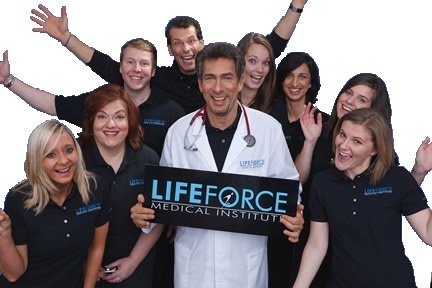The Bioidentical Hormone Debate: Must Reading for | 06/19/14 |
My patients frequently ask me why I keep saying that bioidentical hormones (estrogen and progesterone especially) are so much safer and more beneficial than synthetic hormones (conjugated equine estrogens and progestins).
An excellent literature review was conducted by Kent Holtorf and titled "The Bioidentical Hormone Debate: Are Bioidentical Hormones (Estradiol, Estriol, and Progesterone) Safer or More Efficacious Than Commonly Used Synthetic Versions in Hormone Replacement Therapy". The full text can be downloaded here.
It describes and summarizes 196 studies that investigated bioidentical vs synthetic hormones, specifically with a focus on breast cancer and cardiovascular disease. They chose these 2 diseases because of their primary importance and the confusion and controversy surrounding them and synthetic vs bioidentical hormones. (If they had also reviewed the literature regarding the many additional significant benefits of bioidentical hormones with respect to such diseases as Alzheimer's Disease, colon cancer, osteoporosis, macular degeneration, etc., they would have had to review thousands of studies more).
The evidence is substantial and compelling.
Some of the conclusions:
- Synthetic progestins (such as medroxy-progesterone or levonorgestrel) significantly increase the risk of breast cancer, bioidentical progesterone decreases the risk of breast cancer.
- Synthetic estrogens (such as conjugated equine estrogens) significantly increase the risk of breast cancer while bioidentical estriol does not.
- All estrogens have a very positive effect on lipids and reduce coronary artery spasm, which protects the heart, and may reduce heart disease by 50% when combined with bioidentical progesterone. Substituting a synthetic progestin not only negates this protective effect, but may also increase heart disease significantly.
- Synthetic estrogens significantly increase the risks of blood clots, transdermal bioidentical estrogen does not.
- Synthetic progestins also significantly increase the risk of blood clots, bioidentical progesterone reduces this risk.
If your doctor or anyone else tells you that there is insufficient evidence to support the use of bioidentical hormones, just download this article and hand it to him or her.
I also encourage you to download this article and read it yourself if you have any concerns or doubts.
Mark Rosenbloom, MD
Does Testosterone Therapy Cause Heart Attacks and Strokes? | 06/01/14 |
The study that was published in JAMA (Journal of the American Medical Association) last November 2013 "Association of Testosterone Therapy With Mortality, Myocardial Infarction, and Stroke in Men With Low Testosterone Levels" is profoundly misleading and causing millions of men currently needing Testosterone therapy to avoid this potently life-saving intervention, and others currently on Testosterone therapy to quit.
I believe that this was one of the worst, most misleading, poorly done and damaging to men's health studies that I have ever read in my career.
… and I am not alone…
In a completely unprecedented action, over twenty-five medical societies have grouped together to petition JAMA to retract this misleading Testosterone study.
They claim that JAMA, in publishing this article, has knowingly disseminated "false information" that has "harmed public health, distorted medical science, and violated the trust between medical journals and the consumer." Failure to retract amounts to "medical literature malpractice."
Here is their statement:
The Androgen Study Group
BOSTON, April 10, 2014 /PRNewswire/ -- In an unprecedented action, twenty-five international medical societies have petitioned the Journal of the American Medical Association to retract the article that precipitated recent concerns regarding cardiovascular risks with testosterone therapy, citing "gross data mismanagement" rendering the study "no longer credible." Twenty-two societies have added their names since the original petition was submitted to JAMA two weeks ago. The article by Rebecca Vigen and colleagues from the University of Colorado, published in the November 13, 2013 issue of JAMA, is entitled "Association of Testosterone Therapy With Mortality, Myocardial Infarction, and Stroke in Men With Low Testosterone Levels." The results were widely reported as new evidence that testosterone therapy is associated with cardiovascular risks, resulting in a Food and Drug Administration safety bulletin issued January 31, 2014.
The 25 medical societies represent US and international groups dedicated to education and research in endocrinology, men's health, andrology, and sexual medicine. These medical societies join more than 160 of the world's leading figures in urology, endocrinology, and andrology from 32 countries, from every continent except Antarctica. Individual signers include 8 emeritus professors, 9 journal editors, and 67 full professors. Societies recommending retraction are:
- American Society for Men's Health
- Brazilian Society of Endocrinology and Metabolism
- Canadian Men's Sexual Health Council
- Canadian Society for the Study of Men's Health
- European Society for the Study of the Aging Male
- European Society for Sexual Medicine
- Indonesian Andrologist Association
- International Society for Men's Health
- International Society for Sexual Medicine
- International Society for the Study of the Aging Male
- Italian Society of Andrology
- Italian Society of Andrology and Sexual Medicine
- Japan ASEAN Council for Men's Health and Aging
- Korean Society for Sexual Medicine and Andrology
- Latin American Society for Sexual Medicine
- Malaysian Men's Health Initiative
- Malaysian Society of Andrology and the Study of the Aging Male
- Men's Health Initiative of British Columbia (Canada)
- Middle East Society for Sexual Medicine
- Russian Society for Men's Health
- South Asian Society for Sexual Medicine
- Sexual Medicine Society of North America
- The Society for Men's Health, Singapore
- Society for the Study of Androgen Deficiency
- Society for the Study of Andrology and Sexology, Singapore
- Click here to see the full list.
"This is the first time in history a worldwide community of distinguished researchers, scholars, and clinicians has united to demand removal of a study from the literature," stated Abraham Morgentaler, Chairman of the Androgen Study Group, which submitted the petition to JAMA. "This unprecedented action is a complete repudiation of the false information published by JAMA that has harmed public health, distorted medical science, and violated the trust between medical journals and the consumer. Although science must always be open to new information and ideas, the wholly unreliable data in this study by Vigen et al categorizes these results as misinformation. JAMA has been complicit in creating a media frenzy regarding false risks, and is directly responsible for the new wave of medical malpractice cases against physicians. For the good of consumers, physicians, and science, JAMA should retract the article before it causes even greater harm, accompanied by a letter explaining how its editorial process failed and steps taken to correct it."
This article has already undergone two published corrections, and new revelations raise additional concerns. A first revision was published online November 12, 2013, six days following initial publication, due to the misleading presentation of results as raw data instead of complex, statistically derived estimates. JAMA's decision to wait two months before disclosing this was a revised version, on January 15, 2014, was an ethical breach. A second correction published March 5, 2014, revealed major errors presented in the article's text and figure. Specifically, in response to a letter questioning a group of 1132 men, the authors re-examined the data for this group and discovered the correct number of individuals should only have been 128, an 89% error rate, involving more than 1,000 individuals. The value for a second group was increased by more than 900 individuals. Astonishingly, this group included 100 women, meaning nearly 10% were the wrong gender for the study. New information raises additional questions and uncertainties regarding Figure 2 in the text, the key to their results.
"People find it hard to believe that JAMA would publish a study in which the percentages of men who suffered an adverse event was lower by half in men who received testosterone than untreated men, yet results were reported as if the opposite were true, thanks to absurdly complicated statistical manipulations of the data," stated Andre Guay, MD, Clinical Professor of Endocrinology at Tufts Medical School. "Now we find out this is the gang that can't shoot straight. In my 40 years in medicine I've never before seen a paper that says, 'Here are our data, give or take a thousand individuals.' There is nothing believable in this study."
The percentage of men who suffered an adverse event (heart attack, stroke, or death) based on reported numbers was 10.1% (123 events in 1223 men) in the testosterone group and 21.2% (1587 events in 7486 men) in the untreated group. Those percentages do not appear in the text of the study.
"This article has caused enormous damage," stated Mohit Khera, MD, Associate Professor of Urology at Baylor Medical College. "This article created an unfounded negative perception of testosterone therapy. Physicians discontinued treatment for men who were benefitting from treatment. It harmed physician-patient relations, as patients ask why their physicians placed their health at risk. And a new field of medical malpractice has sprung up overnight, with plaintiff attorneys in the US advertising nationwide for patients who suffered a stroke or heart attack after receiving testosterone. And it's all based on pure nonsense."
"JAMA has violated the public trust," concluded Dr. Morgentaler. "Its peer-review process failed. It recklessly promulgated false information that created the perception of medical risks. It withheld news that the study had been corrected, for two months, until interest had waned. It undermined the academic process by allowing the authors to avoid answering questions posed in letters. The lead author didn't even sign the response to letters. It now stands by a highly statistical study after which it has been revealed that the statistics cannot be trusted. JAMA has left itself vulnerable to criticism that it promotes sensationalism to boost revenues, or is biased against the use of testosterone therapy in men. JAMA's continued support of this discredited study, defying the worldwide community of experts, represents medical literature malpractice. "
About The Androgen Study Group (ASG)
The Androgen Study Group is a newly formed multidisciplinary group of clinicians and researchers dedicated to education and accurate reporting regarding testosterone deficiency in men and its treatment.
For more information, go to www.androgenstudygroup.org.
Contact us
 Please contact us for any questions regarding insurance, our services, scheduling and treatment plans.
Please contact us for any questions regarding insurance, our services, scheduling and treatment plans.
Busy?
To "jumpstart" your evaluation, please download this confidential personal information form (Men's Confidenial Information, Women's Confidential Information), fill out with your information and basic symptoms, and then attach/send it via email to operations@LIFEFORCEMED.com. A LIFEFORCE physician will contact you shortly.
Affiliations







